Module 1 How to learn EnglishUnit 3 Language in use习题课件(共24张PPT)
文档属性
| 名称 | Module 1 How to learn EnglishUnit 3 Language in use习题课件(共24张PPT) | 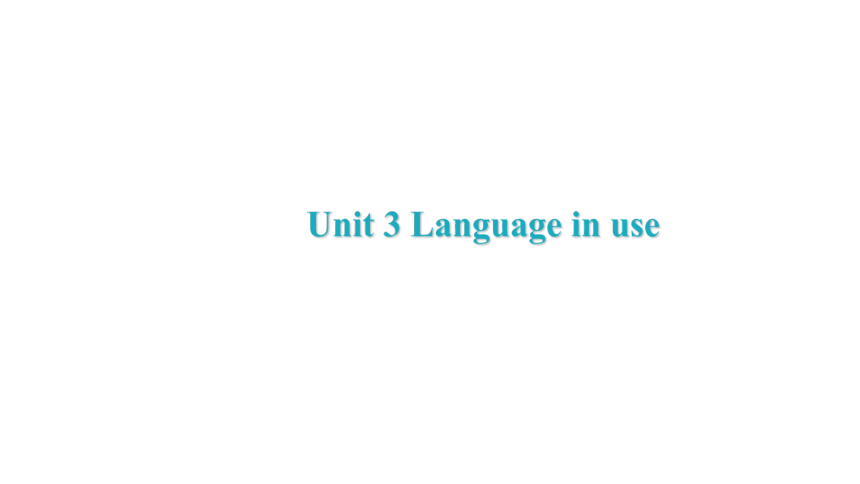 | |
| 格式 | ppt | ||
| 文件大小 | 391.5KB | ||
| 资源类型 | 教案 | ||
| 版本资源 | 外研版 | ||
| 科目 | 英语 | ||
| 更新时间 | 2022-08-16 10:36:16 | ||
图片预览

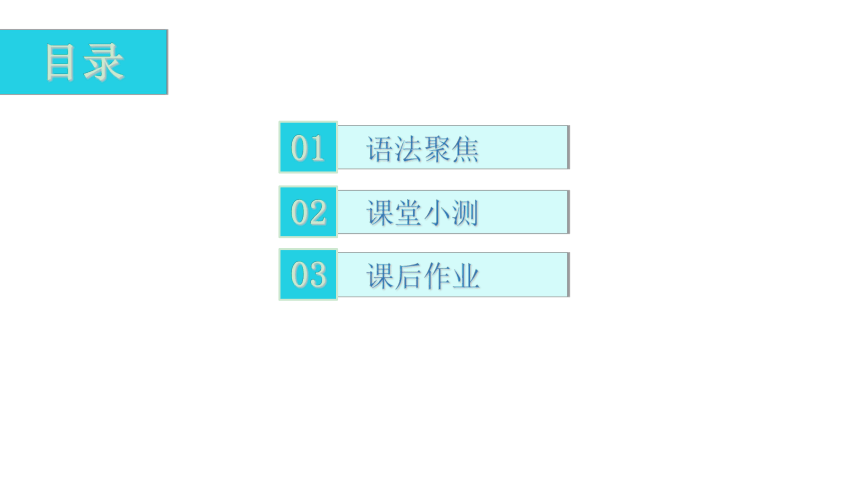
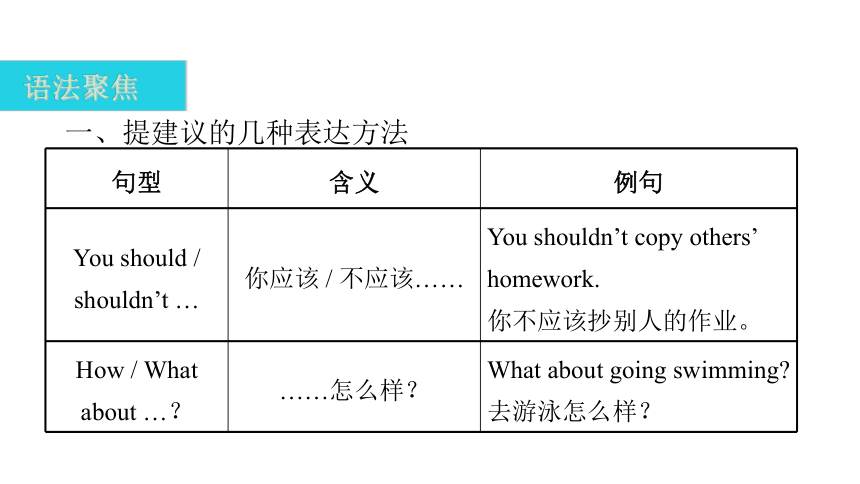
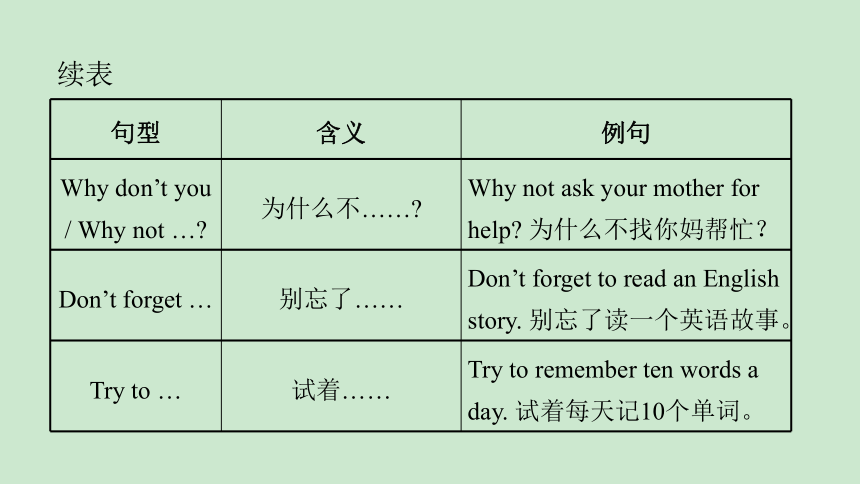
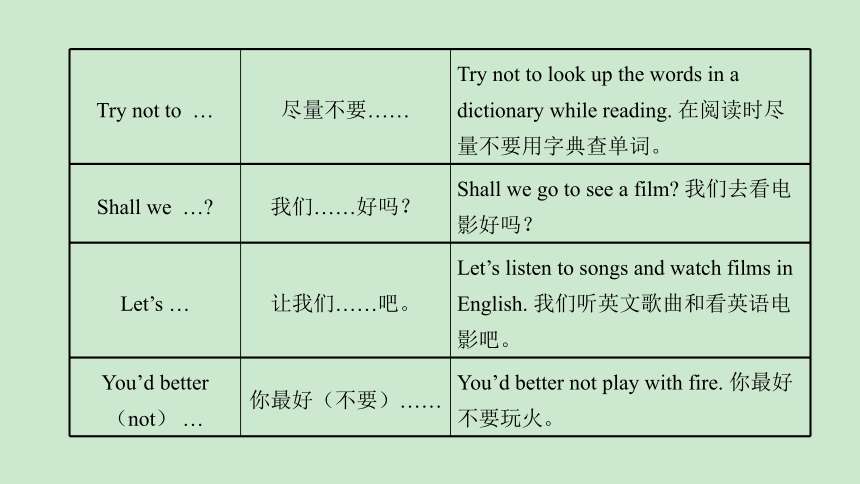
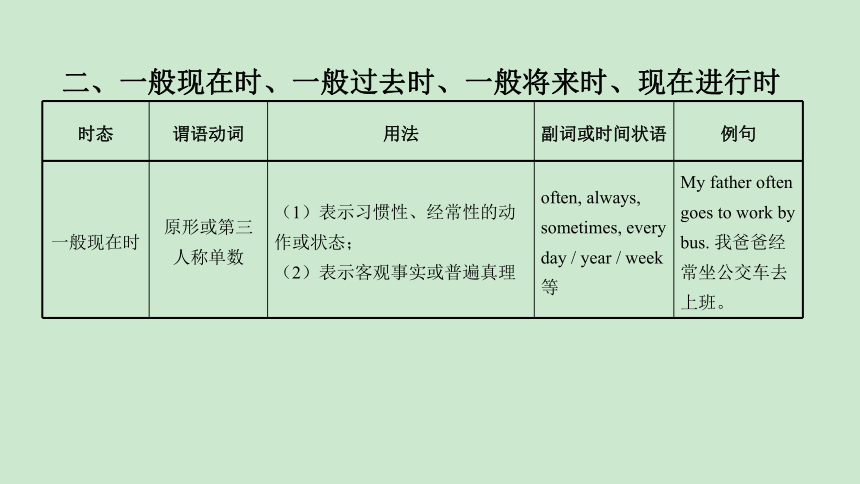
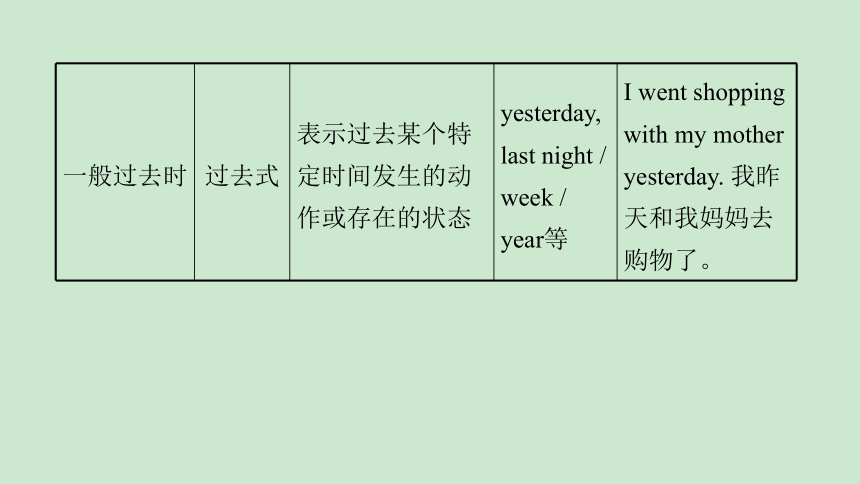
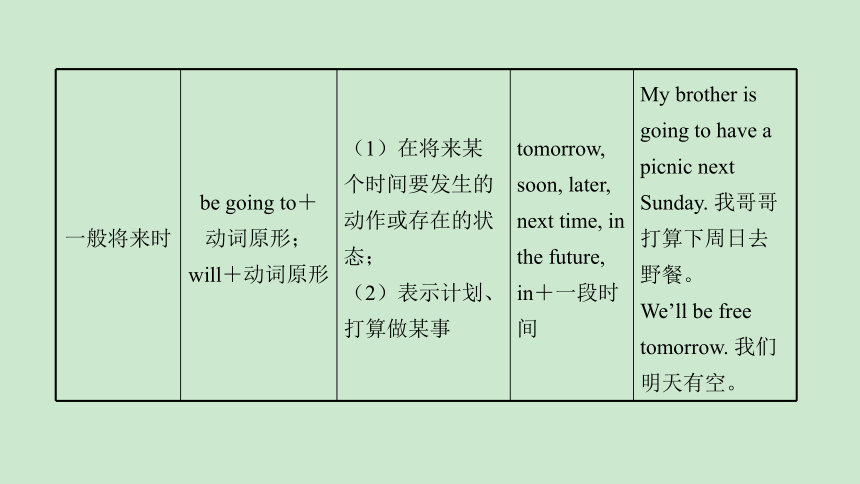
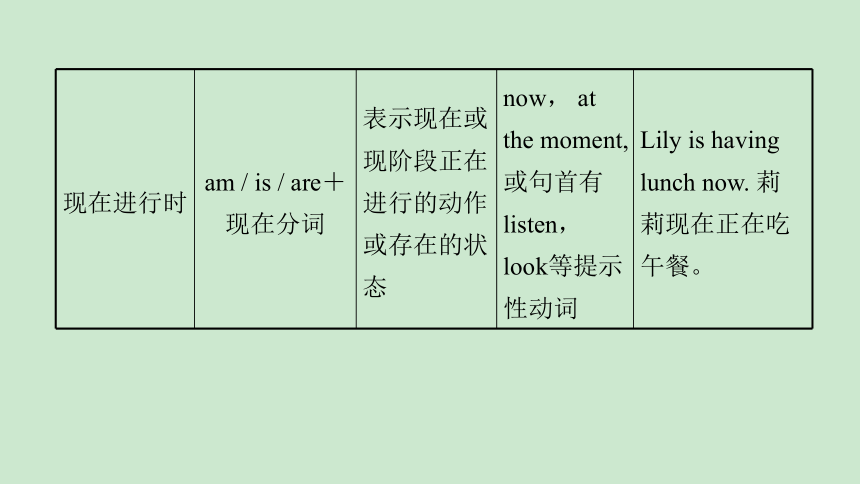
文档简介
(共24张PPT)
Unit 3 Language in use
目录
语法聚焦
01
课堂小测
02
课后作业
03
语法聚焦
一、提建议的几种表达方法
句型 含义 例句
You should / shouldn’t … 你应该 / 不应该…… You shouldn’t copy others’ homework.
你不应该抄别人的作业。
How / What about …? ……怎么样? What about going swimming 去游泳怎么样?
句型 含义 例句
Why don’t you / Why not … 为什么不…… Why not ask your mother for help 为什么不找你妈帮忙?
Don’t forget … 别忘了…… Don’t forget to read an English story. 别忘了读一个英语故事。
Try to … 试着…… Try to remember ten words a day. 试着每天记10个单词。
续表
Try not to … 尽量不要…… Try not to look up the words in a dictionary while reading. 在阅读时尽量不要用字典查单词。
Shall we … 我们……好吗? Shall we go to see a film 我们去看电影好吗?
Let’s … 让我们……吧。 Let’s listen to songs and watch films in English. 我们听英文歌曲和看英语电影吧。
You’d better (not) … 你最好(不要)…… You’d better not play with fire. 你最好不要玩火。
二、一般现在时、一般过去时、一般将来时、现在进行时
时态 谓语动词 用法 副词或时间状语 例句
一般现在时 原形或第三
人称单数 (1)表示习惯性、经常性的动作或状态;
(2)表示客观事实或普遍真理 often, always, sometimes, every day / year / week等 My father often goes to work by bus. 我爸爸经常坐公交车去上班。
一般过去时 过去式 表示过去某个特定时间发生的动作或存在的状态 yesterday, last night / week / year等 I went shopping with my mother yesterday. 我昨天和我妈妈去购物了。
一般将来时 be going to+
动词原形;
will+动词原形 (1)在将来某个时间要发生的动作或存在的状态;
(2)表示计划、打算做某事 tomorrow, soon, later, next time, in the future, in+一段时间 My brother is going to have a picnic next Sunday. 我哥哥打算下周日去野餐。
We’ll be free tomorrow. 我们明天有空。
现在进行时 am / is / are+
现在分词 表示现在或现阶段正在进行的动作或存在的状态 now, at the moment, 或句首有listen, look等提示性动词 Lily is having lunch now. 莉莉现在正在吃午餐。
课堂小测
xcellent
orrect
一、根据中文意思或首字母提示,用单词的适当形式填空,每空一词
1.There are so many mistakes in your homework. You must c________ them.
2. —What do you think of her spoken English
—E________!
natural
basic
vocabulary
3. It’s ______(合乎常情的)to help each other.
4. What’s the ______(主要的)question about learning English
5.She has a large English ____________ (词汇量).
went to
last year
二、句型转换
6.Tom goes to school by bike.(用last year 改写)
Tom ______ school by bike ____________.
7.Linda bought a pen yesterday. (改为否定句)
Linda ____________ a pen yesterday.
didn’t buy
What / How about
What was
doing
8. Let’s go to the English Corner, shall we (改为同义句)
__________________ going to the English Corner
9. The boy was reading English when the teacher came in. (对画线部分提问)
____________ the boy ______when the teacher came in
10. Why don’t you read some English every day (改为同义句)
____________ read some English every day
Why not
C
三、单项填空
( )11. —What’s his brother like
—He is helpful. He always_________________ people in need.
A. helped B. has helped
C. helps D. will help
D
( )12. If you don’t know the word, you can_________________ in a dictionary.
A. look up it B. look after it
C. look it after D. look it up
D
( )13. —What is your plan for next weekend, Lingling
—I _________________ volunteer work in the museum.
A. was doing B. did
C. have done D. am going to do
A
( )14. How about _________________ with us this afternoon
A. going shopping B. go shopping
C. to go shopping D. go to shop
D
( )15. —How can I improve my Chinese
—_________________ read some interesting stories every night
A. Why don’t B. Why not you
C. Why not to D. Why don’t you
四、语法选择(核心素养:文化意识)
Now more than 40 million foreigners around the world are learning Chinese, according to 16 report. The relationship between the United States 17 China is becoming more and more important in the world. This has really influenced the growth of Chinese language learning in the US.
I am Chris 18 the United States. I am one of the many people who are learning Chinese. I 19 at a Confucius Institute(孔子学院)in New York. There are 10 students in 20 class. Some are over thirty years old. Some are middle school students. Our teacher comes from Beijing. He is fun and often tells us interesting things in China.
I think Chinese 21 difficult to learn. 22 challenge for American learners is the writing. Chinese is completely different from any other language in the world. It will take me a lot of 23 to learn enough Chinese characters(汉字). But I think there are many benefits (益处) of spending time in 24 Chinese. 25 important
benefit is that it makes me see things from a different point of view, because Chinese is such a different language from English. I think, for American students, the most important benefit is that learning a challenging language can open up their eyes.
( )16. A. / B. the C. an D. a
( )17. A. nor B. and C. or D. but
( )18. A. from B. of C. to D. in
( )19. A. study B. studied
C. was studying D. am studying
( )20. A. we B. our C. us D. ours
D
B
A
D
B
( )21. A. are B. is C. were D. was
( )22. A. The big B. The biggest
C. Bigger D. Biggest
( )23. A. times B. timing C. time D. timetable
( )24. A. learning B. learn C. learns D. to learn
( )25. A. First B. Firstly C. Ones D. One
B
B
C
A
D
Unit 3 Language in use
目录
语法聚焦
01
课堂小测
02
课后作业
03
语法聚焦
一、提建议的几种表达方法
句型 含义 例句
You should / shouldn’t … 你应该 / 不应该…… You shouldn’t copy others’ homework.
你不应该抄别人的作业。
How / What about …? ……怎么样? What about going swimming 去游泳怎么样?
句型 含义 例句
Why don’t you / Why not … 为什么不…… Why not ask your mother for help 为什么不找你妈帮忙?
Don’t forget … 别忘了…… Don’t forget to read an English story. 别忘了读一个英语故事。
Try to … 试着…… Try to remember ten words a day. 试着每天记10个单词。
续表
Try not to … 尽量不要…… Try not to look up the words in a dictionary while reading. 在阅读时尽量不要用字典查单词。
Shall we … 我们……好吗? Shall we go to see a film 我们去看电影好吗?
Let’s … 让我们……吧。 Let’s listen to songs and watch films in English. 我们听英文歌曲和看英语电影吧。
You’d better (not) … 你最好(不要)…… You’d better not play with fire. 你最好不要玩火。
二、一般现在时、一般过去时、一般将来时、现在进行时
时态 谓语动词 用法 副词或时间状语 例句
一般现在时 原形或第三
人称单数 (1)表示习惯性、经常性的动作或状态;
(2)表示客观事实或普遍真理 often, always, sometimes, every day / year / week等 My father often goes to work by bus. 我爸爸经常坐公交车去上班。
一般过去时 过去式 表示过去某个特定时间发生的动作或存在的状态 yesterday, last night / week / year等 I went shopping with my mother yesterday. 我昨天和我妈妈去购物了。
一般将来时 be going to+
动词原形;
will+动词原形 (1)在将来某个时间要发生的动作或存在的状态;
(2)表示计划、打算做某事 tomorrow, soon, later, next time, in the future, in+一段时间 My brother is going to have a picnic next Sunday. 我哥哥打算下周日去野餐。
We’ll be free tomorrow. 我们明天有空。
现在进行时 am / is / are+
现在分词 表示现在或现阶段正在进行的动作或存在的状态 now, at the moment, 或句首有listen, look等提示性动词 Lily is having lunch now. 莉莉现在正在吃午餐。
课堂小测
xcellent
orrect
一、根据中文意思或首字母提示,用单词的适当形式填空,每空一词
1.There are so many mistakes in your homework. You must c________ them.
2. —What do you think of her spoken English
—E________!
natural
basic
vocabulary
3. It’s ______(合乎常情的)to help each other.
4. What’s the ______(主要的)question about learning English
5.She has a large English ____________ (词汇量).
went to
last year
二、句型转换
6.Tom goes to school by bike.(用last year 改写)
Tom ______ school by bike ____________.
7.Linda bought a pen yesterday. (改为否定句)
Linda ____________ a pen yesterday.
didn’t buy
What / How about
What was
doing
8. Let’s go to the English Corner, shall we (改为同义句)
__________________ going to the English Corner
9. The boy was reading English when the teacher came in. (对画线部分提问)
____________ the boy ______when the teacher came in
10. Why don’t you read some English every day (改为同义句)
____________ read some English every day
Why not
C
三、单项填空
( )11. —What’s his brother like
—He is helpful. He always_________________ people in need.
A. helped B. has helped
C. helps D. will help
D
( )12. If you don’t know the word, you can_________________ in a dictionary.
A. look up it B. look after it
C. look it after D. look it up
D
( )13. —What is your plan for next weekend, Lingling
—I _________________ volunteer work in the museum.
A. was doing B. did
C. have done D. am going to do
A
( )14. How about _________________ with us this afternoon
A. going shopping B. go shopping
C. to go shopping D. go to shop
D
( )15. —How can I improve my Chinese
—_________________ read some interesting stories every night
A. Why don’t B. Why not you
C. Why not to D. Why don’t you
四、语法选择(核心素养:文化意识)
Now more than 40 million foreigners around the world are learning Chinese, according to 16 report. The relationship between the United States 17 China is becoming more and more important in the world. This has really influenced the growth of Chinese language learning in the US.
I am Chris 18 the United States. I am one of the many people who are learning Chinese. I 19 at a Confucius Institute(孔子学院)in New York. There are 10 students in 20 class. Some are over thirty years old. Some are middle school students. Our teacher comes from Beijing. He is fun and often tells us interesting things in China.
I think Chinese 21 difficult to learn. 22 challenge for American learners is the writing. Chinese is completely different from any other language in the world. It will take me a lot of 23 to learn enough Chinese characters(汉字). But I think there are many benefits (益处) of spending time in 24 Chinese. 25 important
benefit is that it makes me see things from a different point of view, because Chinese is such a different language from English. I think, for American students, the most important benefit is that learning a challenging language can open up their eyes.
( )16. A. / B. the C. an D. a
( )17. A. nor B. and C. or D. but
( )18. A. from B. of C. to D. in
( )19. A. study B. studied
C. was studying D. am studying
( )20. A. we B. our C. us D. ours
D
B
A
D
B
( )21. A. are B. is C. were D. was
( )22. A. The big B. The biggest
C. Bigger D. Biggest
( )23. A. times B. timing C. time D. timetable
( )24. A. learning B. learn C. learns D. to learn
( )25. A. First B. Firstly C. Ones D. One
B
B
C
A
D
同课章节目录
- Module 1 How to learn English
- Unit 1 Let's try to speak English as much as possi
- Unit 2 You should smile at her.
- Unit 3 Language in use .
- Module 2 My home town and my country
- Unit 1 It's taller than many other buildings.
- Unit 2 Cambridge is a beautiful city in the east o
- Unit 3 Language in use .
- Module 3 Sports.
- Unit 1 Nothing is more exciting than playing tenni
- Unit 2 This year we training more carefully.
- Unit 3 Language in use .
- Module 4 Planes, ships and trains .
- Unit 1 He lives the farthest from school.
- Unit 2 What is the best way to travel.
- Unit 3 Language in use .
- Module 5 Lao She Teahouse.
- Unit 1 I wanted to see the Beijing Opera.
- Unit 2 It descibes the changes in Chinese society.
- Unit 3 Language in use .
- Module 6 Animals in danger.
- Unit 1 It allows people to get closer to them .
- Unit 2 The WWF is working hard to save them all.
- Unit 3 Language in use .
- Revision module A
- Module 7 A famous story
- Unit 1 Alice was sitting with her sister by the ri
- Unit 2 She was thinking about her cat.
- Unit 3 Language in use .
- Module 8 Accidents
- Unit 1 While the car were changing to red, a car s
- Unit 2 I was trying to pick it up when it bite me
- Unit 3 Language in use .
- Module 9 Population
- Unit 1 The population of China is about 1.37 billi
- Unit 2 Arnwick was a city with 200,000 people.
- Unit 3 Language in use .
- Module 10 The weathe
- Unit 1 It might snow.
- Unit 2 The weather is fine all year round.
- Unit 3 Language in use .
- Module 11 Way of life
- Unit 1 In China ,we open a gift later.
- Unit 2 In England, you usually drink tea with milk
- Unit 3 Language in use .
- Module 12 Help
- Unit 1 What should we do before help arrives?
- Unit 2 Stay away from windows and heavy furniture.
- Unit 3 Language in use .
- Revision module B
